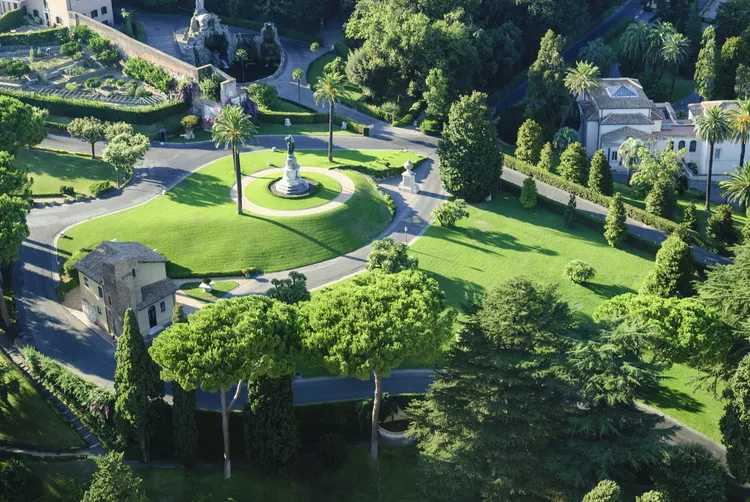The Ultimate Guide to the Vatican Gardens
Address
WC2X+RG, Via Paolo VI, 29, 00120 Città del Vaticano, Vatican City
Get directions
Phone: +39 06 6988 4676
Visit website
History of the Gardens
First conceived in 1279 by Pope Nicholas III, the area was enclosed by walls and planted with an orchard, a lawn, and a garden. However, it wasn’t until the 16th century, under Pope Julius II, that major landscaping took place. Distinguished architect Donato Bramante (one of the designers of St. Peter’s) drew up plans for the garden, which was eventually split into three Renaissance styles: English, French, and Italian. A rectangular labyrinth (garden maze) was added to further enhance its formal grandeur. Consequently, today, the gardens serve as a tranquil sanctuary for Pontiffs, providing respite from the hustle and bustle of the surrounding city.
What to See and Do in the Gardens of Vatican City
As you wander through the gardens, consider these remarkable highlights:
- Lourdes Grotto (Grotta di Lourdes): A replica of the pilgrimage cave in Massabielle, France, where Bernadette Soubirous saw a vision of the Madonna.
- Fountain of the Eagle: A 17th-century fountain celebrating the return of water to the Vatican from the repaired aqueduct of Trajan.
- Papal Coat of Arms: A striking example of topiary art representing the Papal Coat of Arms, featuring a crown and the keys of Saint Peter.
- Casina del Giardiniere (Gardener’s Lodge): This 12th-century building serves as the residence of the head gardener overseeing a dedicated team.
- Saint John’s Tower: Reconstructed in the 1960s, this tower hosts papal apartments and is notable for the 2008 meeting between Pope Benedict XVI and President George W. Bush.
- The Little Flower, Saint Therese of Lisieux: Recognized as the patron saint of the Gardens, a shrine dedicated to her is located along the Leonine walls.
- Our Lady of Fatima: The miraculous survival of Pope John Paul II after being shot is credited to divine intervention from Our Lady.
- Gregorian Tower or Tower of the Winds: Once an astrological observatory, it played a key role in the transition from the Julian to the Gregorian calendar.
- Palazzina di Leone XIII: Known for its beautiful fountains, climbing roses, and the coral tree, which blooms bright red.
- A Piece of the Berlin Wall: A segment of the wall, revealing a hidden painting of Berlin’s St. Michaels Church, gifted to the Vatican.
- Vatican Radio Station: The Marconi Broadcast Centre, established in 1931, where Guglielmo Marconi broadcasted his first message worldwide.
- Vatican Railway Station: This short rail line carries supplies into Vatican City and offers special rail service from the Vatican Railway Station to the Pontifical Villas at Castel Gandolfo.
Visitor Information
Location: Vatican City, 00120 Italy
Hours: Open Monday to Saturday from 9 a.m. to 6 p.m. (final entry at 4 p.m.); closed Sundays, except for the last Sunday of each month.
Admission: Guided tours last 2 hours and must be arranged through the Vatican Museum. These tickets provide unguided access to the Vatican Museums and the Sistine Chapel on the same day.
Prices: €33, reduced €24 (for children aged 6-18 and religious personnel with valid documentation).
Visiting Tips: The tour is conducted on foot, but an open eco-bus tour is available for those with mobility issues, priced at €37/reduced: €23, including an audioguide and map. Note that children under 7 are not permitted on this tour. Wheelchair assistance can be arranged.
How to Get There
Metro: Line A towards Battistini, Ottaviano, or Cipro stations.
Buses: Lines 49, 32, 81, and 982 stop at Piazza del Risorgimento, while 492 and 990 stop at Via Leone IV/Via degli Scipioni.
Tram: Line 19 stops at Piazza del Risorgimento.
Sights and Attractions Nearby
- Castel Sant’Angelo: Originally built as a mausoleum by Emperor Hadrian, this castle along the Tiber River is now a museum.
- The Swiss Guard: Since 1506, the Swiss Guard has been providing security for Vatican City in their traditional uniforms.
- Leonardo Da Vinci Experience: A museum showcasing Da Vinci’s inventions and reproductions of his masterpieces, including The Last Supper.
- Villas of Castel Gandolfo: Situated 45 minutes from Rome’s center, this has been the summer residence of Popes since the 17th century.




